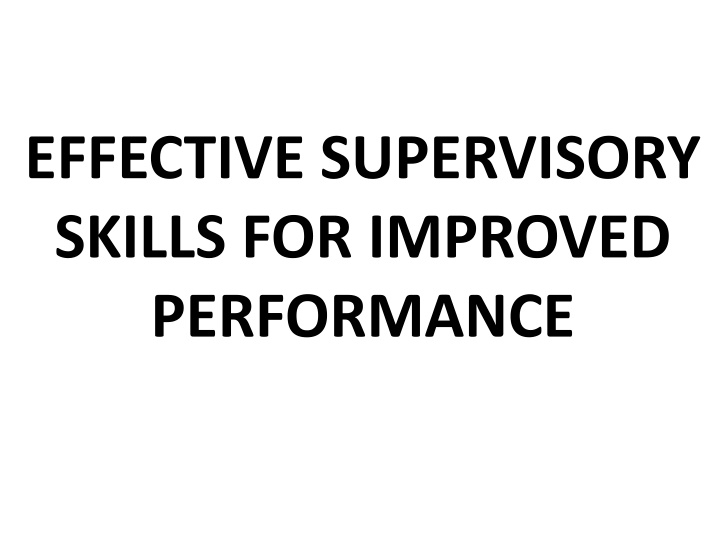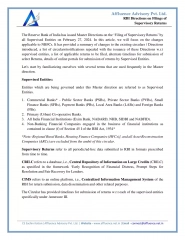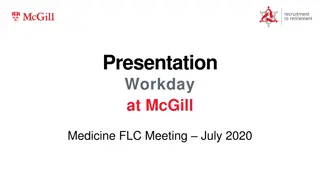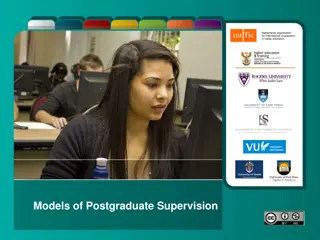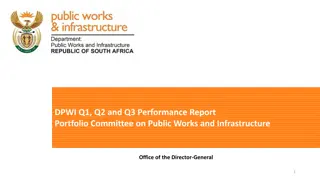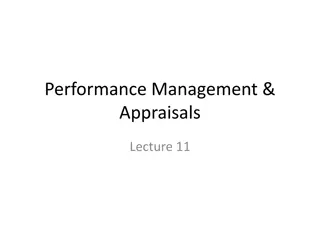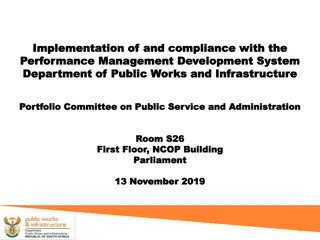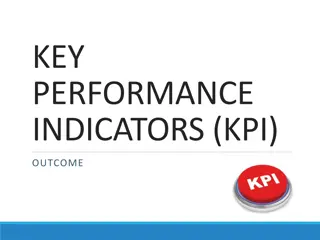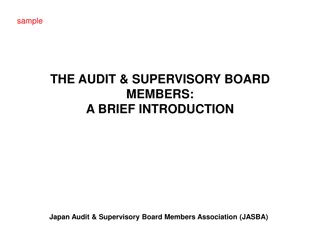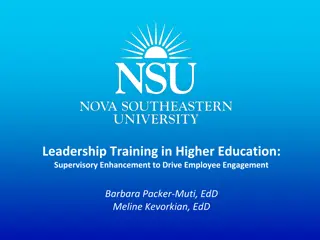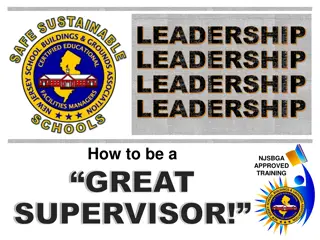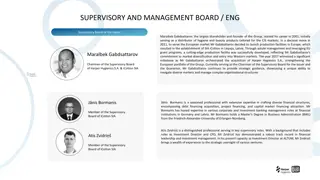Effective Supervisory Skills for Improved Performance
Developing effective supervisory skills is crucial for enhancing organizational performance. Supervision involves guiding, directing, and encouraging staff to achieve set goals, ensuring adherence to standards, and promoting growth in individuals and the organization. Supervisors play a key role in providing support, coaching, and feedback to improve teaching and learning processes. Regular supervision is essential for staff development and maintaining a dynamic and knowledgeable workforce.
Download Presentation

Please find below an Image/Link to download the presentation.
The content on the website is provided AS IS for your information and personal use only. It may not be sold, licensed, or shared on other websites without obtaining consent from the author.If you encounter any issues during the download, it is possible that the publisher has removed the file from their server.
You are allowed to download the files provided on this website for personal or commercial use, subject to the condition that they are used lawfully. All files are the property of their respective owners.
The content on the website is provided AS IS for your information and personal use only. It may not be sold, licensed, or shared on other websites without obtaining consent from the author.
E N D
Presentation Transcript
EFFECTIVE SUPERVISORY SKILLS FOR IMPROVED PERFORMANCE
PRESENTED AT THE 2019/2020 EMERALD SCHOOLS STAFF RETREAT THEME: INNOVATION, INTEGRATION AND MOTIVATION: TOOLS FOR SUSTAINABLE GROWTH
EFFECTIVE Accomplishing set goals/objective Effectiveness is about doing the right task, completing activities and achieving goals.
Supervision means to direct, oversee, guide or to make sure that expected standards are met. Thus, supervision implies the process of ensuring that principles, rules, regulations and methods prescribed for purposes of implementing and achieving objectives are effectively carried out. knowledge and experiences to oversee, evaluate and coordinate the process of improving an organisation. Supervision therefore involves the use of expert
Supervision is an important requirement in management that concerns itself with the tactics of efficient and effective management of human and material resources. Supervision is a way to advise, guide, refresh, encourage, stimulate, improve and oversee staff in the hope of seeking their co-operation in order that they may be successful in the performance of their duties. Supervision as a process of guiding, directing and stimulating growth with the overall view of improving teaching and learning process better for the learner.
A supervisor is expected to assist in the learning environment to maximize, through collaborative efforts, the available resources to achieve the set goals. He/She is to ensure instructional supervision, professional development and evaluation. A supervisor is anyone assigned the function of helping teachers to improve on their instructional competencies. Supervision involves motivating the teacher to explore new instructional strategies to improve teaching and learning . The teacher must be made aware of educational goals and standards to be implemented.
Supervision is necessary because: 1. Not all teachers are dynamic and knowledgeable but the system is dynamic. This means that supervision is necessary so as to enable these categories of staff. 2. Staff need to be skilled and up to date in their profession and this can only be achieved when they are supervised regularly and effectively in order to enhance good relationship between supervisors and teachers.
3. To ensure the stimulation of professional growth of staff and the entire system and to motivate staff. 4. To ensure that the employees do what is expected of them. Based on the above assertions we may able to assert that the need for proper and effective rigorous supervision is to create a good atmosphere for dynamism, professionalism, improved performance of the staff and ultimately the students.
1. Pedagogical Skills: These include mastery of subject matter, teaching methods, improvisation, presentation of content, preparation of lesson notes, lesson plans and units etc. 2. Evaluation Skills: These include questioning, continuous assessment and examination skills. 3. Disciplinary Skills: These include class control, punishment, use of rules and regulations and maintenance of order. 4. Motivational Skills: Issues bordering on rewards and reinforcement are emphasized. 5. Reportorial Skills: Documentation of report card, class register, log book, attendance book etc.
6. Managerial Skills: These are skills on time management, good use of teaching aids/instructional materials, difficult situations, and students behaviour. 7. Interactive Skills: Creation of rapport, teacher s personality and general characteristics, cooperation etc. 8. Analytical Skills: Possession of mathematical ability, statistical computation and interpretation of data etc. The importance of acquiring these skills cannot be left to chance or in the hands of just anyone.
6. Managerial Skills: These are skills on time management, good use of teaching aids/instructional materials, difficult situations, and students behaviour. 7. Interactive Skills: Creation of rapport, teacher s personality and general characteristics, cooperation etc. 8. Analytical Skills: Possession of mathematical ability, statistical computation and interpretation of data etc. The importance of acquiring these skills cannot be left to chance or in the hands of just anyone.
Supervisors usually wear two or three other hats, but their specific responsibilities tend to include some or all of the following arranged in order of scope or reach: 1. Mentoring or providing for mentoring of beginning staff to facilitate a supportive induction into the profession. 2. Bringing individual staff up to minimum standards of effective performance (quality assurance). 3. Improving individual staff competencies, no matter how proficient they are deemed to be.
4. Working with groups of teachers in a collaborative effort to improve students learning/performance. 5. Working with groups of teachers to adapt the local curriculum to the needs and abilities of diverse groups of students while bringing it in line with state, national and international standards. 6. Relating teachers' efforts to improve their teaching to the larger goals of school wide improvement in the quest for quality learning for all children.
In a nutshell, the responsibilities of supervisors could be outlined as follows: 1. Helping teachers and stimulating curriculum improvement 2. Emphasizing the use of group process with teachers, students and other school personnel. 3. Performing administrative functions to help instructions. 4. Teaching of teachers for improved instruction through internal seminars and workshops.
Supervision involves evaluation, monitoring and quality control for the purpose of curriculum and infrastructural development and improvement. In order to achieve this, some specific tasks of the supervisor in a modern school have been identified and listed here under; a) Helping supervisors to understand students better b) Helping teachers and individuals for professional growth c) Acquiring cooperating spirit for team work d) Making better use of teaching materials e) Improving methods of teaching f) Improving teacher s appraisal of his standards
g) Acquisition of originality for the teacher within the community. h) Faculty plan for curriculum improvement. The common denominator in the objectives of supervision as outlined above is to help teachers become more effective in planning their class work (utilizing maximally, textbooks and other basic materials and curricular aids) as well as helping teachers with guidance and evaluation.
1. The Nature of Lesson Plan The lesson plan is a reflection of the level of preparedness as well as the effort the teacher made in gathering information for the lesson. So a poorly written lesson plan not only indicates the quality of the teacher, but also the level of commitment to his primary task of teaching. The supervisor must critically examine the following items of the lesson plan: a)The clarity and appropriateness of the learner behavioural objectives b) The relevance and adequacy of the lesson notes c) Selection of appropriate teaching aids/instructional materials d) Selection of appropriate evaluation techniques to determine the extent to which the learning objectives are met.
2. Lesson Presentation Teaching is said to be effective if the desired objectives are achieved. The supervisor is required to carefully pay attention to the following areas: a) The introduction of the lesson and the teacher s ability to maintain students attention throughout the duration of the lesson b) The teacher s voice quality, speech, clarity of expression, intelligibility and appropriateness of language, effective use of learning materials. c) Teacher s knowledge of the subject matter in terms of structure and sequence d) Use of classroom management techniques including skills in affecting student s participation in class activities.
3. Reference Materials The use of appropriate reference materials such as textbooks, scheme of work and syllabus cannot be overlooked. The supervisor must look into the following: a) The duration of item or topic. b) The relevance and logicality of the materials used c) The sequence of presentation of contents d) Use of current as opposed to obsolete materials.
4. The Relationship between Teacher and Students Without doubt, a harmonious interpersonal relationship between teachers and students could engender learning and attainment of educational goals. In this regard, the supervisor must seek for genuine love and concern, positive and acceptable disposition between and among the teachers and students. His ability to accommodate or tolerate and, if possible, lend a helping hand through guidance and counseling services must be considered.
5. Classroom Management Effective classroom management facilitates teaching and learning process. The supervisor must be conversant with the following: a) Ability to discipline and control students b) Reward skills to reinforce good performance or conduct c) Ability to identify cases and causes of students misbehaviour d) Creation of conducive classroom climate e) Sitting arrangement of students f) Classroom physical condition
6. Personality of the Teacher Teacher s personality includes among things his personal traits or characteristics, emotional status, appearance, intelligence, physique, leadership skills, communication skills etc.
Let me make one other thing clear: all of these skills are simple and basic. For some of these, you re going to think Obviously of course that s what a supervisor should do. However, just because they are simple does not mean they are EASY. If they were, everyone would be an amazing supervisor.
1. Listening This one is simple right? Well as I said before, simple and easy are not the same things. Try this: the next time you re talking to someone, try forcing yourself not to speak for 2 full minutes. Really listen to what the person is saying. You will know how difficult it is for you to stay quiet. 2. Availability Availability can mean a lot of things, both tangible and intangible. On the tangible side, it means being physically present at work and in the office/designated space. Of course, you re not going to be at your desk every second of the day, but hiding away all day or by taking too many off-duty excuses isn t productive. On the more intangible side, availability means being mentally present and available and being clear about when you can t be. If you are under a lot of stress in meeting deadlines, you need to let your supervisees know that you won t be able to help them think through a challenge. But don t let the can t times take over the can times or you ll create problems.
3. Mission-focused/priority-setting Here is what priority setting comes down to: Figure out what is most important. Do that first. It is that simple and that difficult. We are mission-focused organizations and everything we do, everyday, should help us achieve that mission. 4. Transparency Not every decision needs a full, 360 degree explanation, but lots of secrecy is frustrating and ultimately dis- empowering to those you supervise. Being transparent also means admitting when you re wrong or when you don t know the answer. No one is perfect and if you constantly try to hide behind a perfect image, the downfall will be that much harder.
5. Delegation Delegation is arguably the hardest of these skills to learn and perfect. Delegation basically means transferring decision-making authority to another employee for a task not necessarily within one s job description while still retaining ultimate responsibility for the task. There are three key pieces of this: Responsibility setting clear expectations, but not step-by-step instructions on how something should be done Authority the delegatee is given the right to make decisions Accountability delegatee is responsible for the work, but delegator has ultimate responsibility 6. Taking Responsibility and Giving Credit When you delegate authority, you are responsible for what your supervisee does. You must take responsibility for the mistakes. BUT you must also give credit for the good things.
7. Realism Again, simple: DO NOT make commitments that you and your staff can t keep. Promising the world to a funder, sponsor or partner does no one any good especially if you can t deliver. Putting that extra pressure on your employees (not to mention yourself) just creates all kind of unnecessary stress. You also need to be realistic about what you can do as a supervisor don t be a bottleneck. Supervisory skills are an integral factor in how well a manager relates to his employees. If misunderstandings, tardiness, absenteeism, missed deadlines or shoddy work are plaguing your department/unit/organisation, then it might be time to reassess how well you relate to your workers and change your focus to improving your supervisory skills so that your employees can be productive and feel good about their work experience with you.
According to Stanford Research Institute International and the Carnegie Mellon Foundation, 75% of long-term job success depends on soft skills. The benefits of having employees with strong soft skills include better customer service, improved communications and team interactions, stronger relationships, and increased efficiency.
1. Communication 86% of employees and executives cite lack of collaboration or ineffective communication for workplace failures, according to ClearCompany. Supervisors with developed communication skills are able to use listening techniques and nonverbal strategies to improve conversations. It is essential for a supervisor to be able to balance time constraints and a heavy workload while managing other employees and projects. Having excellent communication skills allows supervisors to speak with impact, whether it be off-the-cuff dialogue or brief updates to their team. It is essential to keep thoughts organized and to the point. Giving and receiving feedback is another area that can be improved with developed communication skills. When using the right techniques, feedback can be used to reinforce or change behavior.
2. Conflict Resolution Conflict is when change happens and stances differ. When a supervisor has the ability to manage conflict well, issues are quickly resolved and successful relationships are developed. A supervisor s ability to define and identify conflict styles, causes, and methods for handling conflict can improve the department s or organization s productivity. According to CPP s Global Human Capital Report, where training does exist, it adds value: over 95% of people receiving training as part of leadership development or on formal external courses say that it helped them in some way. A quarter (27%) say it made them more comfortable and confident in managing disputes and 58% of those who have been trained say they now look for win win outcomes from conflict.
3. Leadership Supervisors with leadership skills help bring accountability to their teams by creating a supportive and motivating work environment. Leaders are able to delegate and manage a wide variety of skillsets. It is important for supervisors to lead their teams in the most effective way by recognizing where the strengths are, where improvement is needed, and how to properly use the skillsets of each team member. The leader must offer praise publicly, provide support, communicate clearly and effectively, be informed.
4. Critical Thinking Critical thinking is a crucial skill in understanding how to methodically, strategically, and collaboratively make decisions, solve problems, and foster innovation. A study by Pearson notes that the higher up the ladder a position is the more essential critical thinking becomes. A supervisor with critical thinking skills has the ability to develop a step-by-step process from targeting the problem to developing a solution. Critical thinking also helps in situations in which groups have different thinking styles and need a collaborative environment created to successfully work through issues.
5. Interpersonal Skills Different from communication skills, interpersonal skills are important for a supervisor to identify and build a purposeful team culture within an organization. Interpersonal skills enable an individual to develop highly effective teams that are built upon consensus, effective meetings, social style understanding and relationships.
6. Time and Priority Management Supervisors with time and priority management skills can boost productivity and efficiency. Being able to balance a heavy workload and time constraints while managing and delegating other employees and projects is an essential skill. It is ideal for supervisors to understand what is urgent and what is important. The University of Georgia conducted a study that found that people who practice good management techniques often find that they are more productive, feel less stressed, get more things done, have more energy, and feel better about themselves . Supervisors with time and priority management skills are able to understand the differences in employee s time and priority management and adjust projects and workloads to ensure success.
7. Diversity and Generational Differences in the Workplace The University of Florida studied workplace diversity and found that respecting individual differences will benefit the workplace by creating a competitive edge and increasing work productivity. Diversity management benefits associates by creating a fair and safe environment where everyone has access to opportunities and challenges. It is crucial for supervisors to have the ability to be aware of workplace diversity and understand the gaps and differences that exist as well as their impact. Being aware of diversity issues helps supervisors appreciate the different experiences and places value on the impact it has on the workplace.
8. Problem Solving Good problem solving skills are fundamentally important within the workplace. AchieveGlobal reports that successful problem solving translates into enhanced productivity and increased profit. A valuable supervisor is someone who not only knows how to take an issue and find the root of the real problem but also has a process for solving the problem in a structured manner. Supervisors with excellent problem solving skills can greatly benefit any organization. No matter who you supervise, I think there are 7 core skills that you need to understand, practice and think about all the time. Obviously, supervising an intern or entry level employee is very different than supervising a senior staff but I think these skills are the basics that you need no matter who you supervise.
Conclusion The need to acquire relevant skills by those charged with supervisory roles aimed at achieving set goals cannot be undermined. Systems/organisations and particularly students performance will be better for it. Effective supervision is the glue of a successful school/organization.
Thank you for your audience Okiemute C. ALUYAH
